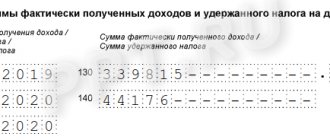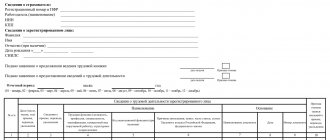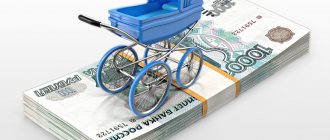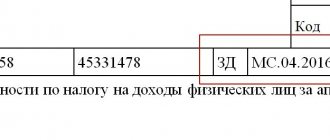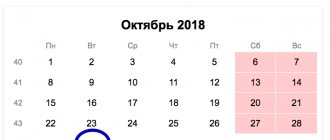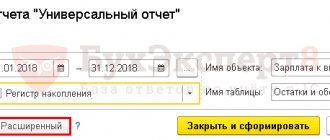Kontur.Accounting is a web service for small businesses!
Quick establishment of primary accounts, automatic tax calculation, online reporting, electronic document management, free updates and technical support.
Try it
Tax laws are constantly changing. Sometimes the movement happens for the better for entrepreneurs and organizations, and sometimes for the worse. You have to keep up with innovations in order to correctly record taxes in the new year and avoid fines. In this article we will look at the main legislative changes in 2019.
Changes in tax audits
Another important change in the VAT area is the reduction in the duration of a desk audit from 3 to 2 months. But don't rush to rejoice. If errors are discovered, tax authorities can extend the audit for up to 3 months.
The changes will also affect on-site inspection. If you submit an updated tax return with a lower tax amount than the previous one, then get ready to meet visiting inspectors. As part of the re-audit, they will check the relevance and correctness of the calculations for reducing the tax payable.
Sometimes an entrepreneur does not agree with the tax authorities and goes to challenge the tax audit report. Now you have the right to familiarize yourself with all inspection materials during the period of challenge.
The procedure for confirming the right to apply a preferential VAT rate
Article 165 of the Tax Code of the Russian Federation “The procedure for confirming the right to apply a tax rate of 0 percent” was supplemented with the following paragraph:
When selling the services provided for in subclause 4.3 of clause 1 of Article 164 of the Tax Code of the Russian Federation, to confirm the validity of the application of the 0 percent tax rate and tax deductions, a register of transportation documents for the transportation of passengers and luggage, defining the transportation route, indicating the numbers of transportation documents, is submitted to the tax authorities, points of departure, points of destination, as well as all intermediate points of the transportation route, if available, the date of provision of services, the cost of services for the transportation of passengers and baggage.
We are talking about a preferential rate for air transportation bypassing Moscow and the Moscow region. The same article clarifies the procedure for exempting from VAT the gratuitous transfer of goods (work, services) and property rights within the framework of charitable activities. It has been determined that if the recipient of such goods (work, services), property rights is an organization or individual entrepreneur, the documents confirming the right to tax exemption are:
- agreement or contract on gratuitous transfer;
- act of acceptance and transfer of goods (work, services), property rights or other document confirming the transfer.
Unified agricultural tax and VAT
Previously, agricultural enterprises did not pay VAT. From 2020, individual entrepreneurs and organizations on the Unified Agricultural Tax will pay VAT. Paying VAT will allow it to be deducted, which was not available before 2020. But the law also provides for exceptions. If you work for the Unified Agricultural Tax and your revenue in 2018 is less than 100 million rubles, then you do not have to pay VAT. But the threshold value will be reduced by 10 million rubles annually. For example, revenue for 2020 should be no more than 90 million, for 2020 - no more than 80 million, for 2021 - no more than 70 million, and so on.
New taxes for Russia
Among the planned and already approved amendments to the Tax Code, there is the introduction of completely new taxes that were previously absent from the fiscal practice of the state. Among these are:
- Professional income tax (PIT). After long discussions, the state formulated the main criteria for the new fee in three Federal Laws dated November 27, 2020 - No. 422,423 and 425 Federal Law. Starting from the new year, individuals, including individual entrepreneurs, with an income of no more than 2,400,000 rubles per year will be charged from 4 to 6%, when interacting with individuals and individual entrepreneurs, respectively. Until December 31, 2028, changes in Russian taxes in this area are experimental in nature and will be levied only in a few regions. After the end of the “test” period, the NDP will be finally approved or cancelled.
- Environmental tax is a broad concept that provides not only for changes in transport taxes in 2020, but also for the introduction of additional fees for manufacturers of disposable tableware and devices for preparing food in the field (barbecues).
- The collection on hookah mixtures and liquids for “vapes” - tobacco for hookahs, as well as liquids for electronic cigarettes and steam generators (vapes) will be subject to excise tax. Initially, the amount of the fee was determined to be 457 rubles/kg in 2020, then it is planned to carry out an annual indexation of the fee. Mixtures that do not contain tobacco also fall under the scope of the new Law.
- Excise tax on alcohol - significant changes in taxes on goods in this group, are planned by the government in order to reduce the share of counterfeit alcoholic beverages based on denatured alcohol. The fee for ethyl alcohol will be 107 rubles, and for denatured alcohol - 532 rubles. Thanks to the new prices for alcohol, it will be unprofitable to purchase unsuitable raw materials. If an organization is engaged in the production of perfumes, the state grants it the right to receive a tax deduction, but only after presenting evidence of activity.
Deflator coefficient
The bill “On establishing deflator coefficients for 2019” establishes the main deflator coefficients for 2020:
- 1.915 - K1 for UTII;
- 1.729 — deflator coefficient for personal income tax;
- 1.518 - according to the simplified tax system, PSN and FL property tax;
- 1,317 - for trade tax.
The deflator coefficient is an annually adjusted value that takes into account changes in consumer prices in Russia. It is needed to calculate some taxes.
Organizational property tax
In terms of regulating the property tax of legal entities, there are also new changes in tax legislation in 2020.
| What has changed (since 01/01/2019) | How did it happen | As it was | Which regulatory norm has changed (appeared, lost force) |
| Taxation of movable property | Not produced | Produced | Clause 1 of Art. has been changed. 374 Tax Code of the Russian Federation |
| Number of grounds for adjusting the cadastral price of a taxable property | The tax paid for previous periods, calculated from the cadastral value, can be recalculated on one of the following grounds: — change in the characteristics of the object; — correction of a technical error in the Unified State Register and errors that were made when calculating the cadastral price; — price revision by decision of the Rosreestr commission or the court; — establishment of a market price by decision of a commission or court | 2 bases were used: — correction of errors in establishing the cadastral price; — change in price based on a decision of a commission or court | Clause 15 of Art. has been changed. 378.2 Tax Code of the Russian Federation |
| Calculation of tax taking into account changes in the characteristics of the taxable object | From the date of amendments to the Unified State Register of Real Estate | Year to date |
Possible innovations from 2020
A number of innovations are still at the draft stage and it is impossible to say unequivocally that they will come into force on January 1, 2020. But it’s still worth mentioning possible changes:
Exemption of individual entrepreneurs from filing a declaration under the simplified tax system. The President's message to the Federal Assembly speaks of the abolition of the simplified tax system declaration for entrepreneurs. The goal is to make it easier for newbie entrepreneurs to do business. It is most likely that the change will affect individual entrepreneurs using the simplified “Income” system who use online cash registers. The tax authorities already see all the receipts, so the declaration simply duplicates the information provided by the online cash register.
Tax on professional income. A draft new tax for self-employed individuals is also under consideration. They plan to introduce this tax as part of an experiment in Moscow, the Moscow and Kaluga regions and the Republic of Tatarstan.
Financial statements. The bill plans to oblige companies to submit accounting reports electronically only to the Federal Tax Service. Rosstat will no longer have to send a second copy of the report.
To keep abreast of changes throughout the year, easily keep records, pay salaries, pay taxes, contributions and report - use the cloud service Kontur.Accounting. The service is updated in a timely manner to comply with current legislation, protecting you from sanctions from tax authorities. The first month of use of the service is free for all new users.
Changes in personal income tax in 2020
From 01/01/2021 interest on deposits will be subject to personal income tax
From 01/01/2020:
- One-time compensation for teaching staff received under the state program is exempt from personal income tax. The non-taxable amount is limited to 1 million rubles. The benefit will apply to those payments for which the right to receive appeared in 2020 - 2022 (currently this exemption applies only to doctors);
- Organizations with a staff of 10 people are required to use electronic forms 6-NDFL and 2-NDFL (Federal Law of September 29, 2019 No. 325-FZ);
- are not subject to personal income tax: payment for travel to and from the place of vacation for employees living in the Far North and equivalent areas (Federal Law No. 147-FZ of June 17, 2019);
- payment of extra days off to care for a disabled child. The new norm concerns income received in 2020 (Federal Law dated June 17, 2019 No. 147-FZ);
- writing off a bad debt if two conditions are simultaneously met (Federal Law No. 210-FZ of July 26, 2019): the individual debtor is not recognized as interdependent with the creditor and is not his employee. The condition must be met throughout the entire period of the debt;
- This is not financial assistance or counter-fulfillment of obligations.
Starting from 01/01/2019 (Federal Law dated 09/29/2019 No. 325-FZ has retroactive effect), when receiving real estate, vehicles, shares, shares or shares as a gift from an individual who is not an individual entrepreneur, as well as a close relative of the recipient, the latter must independently calculate and pay personal income tax on the income received (until January 1, 2019, in such cases, it was possible to apply a property deduction in the amount of 250 thousand or 1 million rubles, depending on the type of property sold), and from January 1, 2020, income from the sale of donated property can be reduced for the amount on which personal income tax was paid upon receipt, or for the amount of the donor’s expenses for the acquisition of this property, which he did not previously take into account for taxation (subclause 2, clause 2 as amended by Federal Law No. 325-FZ of September 29, 2019) .
That. when selling donated property you will no longer have to pay personal income tax twice
From 01/01/2019:
- Taxpayers have the right to receive a tax deduction from the cost of any medications prescribed by a doctor (prescribed in a prescription), and not just those named in the List (clause 3, clause 1, article 219 of the Tax Code of the Russian Federation; clause 5, article 2 of Federal Law No. dated June 17, 2019 147-FZ);
- a new tax return form is being introduced (used for reporting for 2020);
- The condition on tax residence of the Russian Federation has been excluded when income from the sale of real estate is exempt from personal income tax. Thus, all those people who live more abroad than in Russia will finally get rid of the exorbitant personal income tax in their homeland.
- a one-time payment to judges for the purchase of housing is not subject to personal income tax (clause 73 of Article 217 of the Tax Code);
- Personal income tax is paid on field allowances over 700 rubles (clause 3 of Article 217 of the Tax Code)
- the deflator coefficient for personal income tax for 2020 is 1.729 (Draft Order of the Ministry of Economic Development).
- Personal income tax is not paid on the sale of residential houses, apartments, rooms, including privatized residential premises, dachas, garden houses or share(s) in them, as well as vehicles that individuals used in business activities (Federal Laws of November 27, 2018 No. 424-FZ and No. 425-FZ “On amendments to parts one and two of the Tax Code of the Russian Federation and certain legislative acts of the Russian Federation on taxes and fees”).
An important condition for the exemption of such income from taxation remains compliance with the minimum maximum period of ownership of this property - three or five years (until 01/01/2019, such income was subject to personal income tax in all cases).
When selling property that was owned for less than the established period of ownership, it is necessary to calculate and pay personal income tax.
However, from January 1, this amount can also be reduced by applying a property tax deduction. Thus, income received by a taxpayer already in 2020 may be reduced by the amount of actual and documented expenses (including before 2019) associated with the acquisition of this property, minus previously taken into account expenses when applying special tax regimes or in composition of professional tax deductions.
Changes in income tax in 2020
From 01/01/2020:
- You can change the depreciation method only once every five years. Now the limitation applies only when switching from a nonlinear method to a linear one;
- educational and medical organizations can apply a preferential rate indefinitely. Under the previous rules, these organizations could use a 0% rate only until January 1, 2020;
- The convention on combating tax base erosion will partially come into force. If you pay a foreign company from a country that has ratified the convention income that is subject to withholding income tax, you may encounter restrictions in the application of benefits (Federal Law No. 79-FZ dated May 1, 2019);
From 01/01/2019:
- Dividends are income in the form of property that is received by a participant upon leaving the organization or upon its liquidation (Clause 1, Article 250 of the Tax Code of the Russian Federation). Income is defined as the positive difference between the market value of the property received and the actually paid price of the shares, and the property itself is taken into account for profit taxation at the market value at the time of its receipt (Clause 2 of Article 277 of the Tax Code of the Russian Federation).
- The taxpayer independently determines the amount of tax in relation to dividends received (clause 2 of Article 275 of the Tax Code of the Russian Federation). If, on the day of the decision to leave the organization or its liquidation, he has continuously owned 50% of the shares in the authorized capital of the company paying dividends for 365 calendar days or more, and the amount of such ownership is at least 50% of the total dividend payments, then the tax is calculated according to rate 0%.
- In other cases, the rate on dividends received by Russian companies from Russian and foreign organizations is 13%. For dividends received by a foreign company on shares of Russian organizations, as well as for dividends from participation in the capital of an organization in another form - 15%.
- If a participant in an organization received a loss during the liquidation of the company or upon withdrawal from it, then it is defined as the negative difference between the income in the form of the market price of the property received by the participant and the cost of the share actually paid by the participant on the date of liquidation of the organization or withdrawal from it. Such a loss is taken into account (clause 8, clause 2, article 265 of the Tax Code of the Russian Federation) as part of non-operating expenses.
Accounting and tax news in 2020
The main accounting and tax news in 2020 are:
- increasing VAT rates;
- partial cancellation of reduced rates on mandatory insurance premiums;
- removal from taxation of property in the form of movable objects;
- changing the rules for including in tax expenses the payment for the passage of heavy trucks in the Platon system.
As a result of these amendments to the Tax Code of the Russian Federation, the Federal Tax Service had to clarify the forms of tax reports, and the orders corresponding to these amendments have either already been published or are awaiting registration with the Ministry of Justice.
It is also worth noting among the news of accounting and tax accounting in 2020 - clarification of reporting forms for personal income tax and changes in the accounting of foreign currency according to PBU 3/2006.
All the changes will be discussed in more detail below.
New in tax legislation in 2020 regarding VAT
The increase in the VAT rate was approved by Law dated August 3, 2018 No. 303-FZ.
The increase in VAT is one of the main changes in the tax legislation of the Russian Federation from January 1, 2020.
In practice, the following categories will have to pay VAT in a new way:
- Taxpayers - Russian legal entities and individual entrepreneurs.
- VAT agents, that is, companies and individual entrepreneurs purchasing services, work, property from foreign business structures that are not registered in the Russian Federation as tax payers.
For information on transactions subject to the new taxation, see Table 2.
Table 2. New in tax legislation from 2020 on VAT
| Taxable operation | VAT tariff in 2020 |
| Sales of goods, services or works in the Russian Federation | 20% |
| Import of property into the Russian Federation | |
| Installation and construction activities for your needs | |
| Advance payments for the supply of goods, services or works taxed at a rate of 20% | 20/120 |
| Lease of state property and municipal property from government agencies | |
| Purchase of scrap metal (non-ferrous or ferrous) | |
| Purchase of property, services or work from foreign companies and individual entrepreneurs who do not pay Russian taxes |
Cancellation of benefits on contributions in 2020
Cancellation of reduced rates on mandatory insurance premiums in accordance with the Law of 03.08.18 No. 303-FZ.
Another innovation in tax legislation from January 1, 2019 - for periods starting from the beginning of the year, contributions to compulsory health insurance, compulsory medical insurance and compulsory social insurance for disability and maternity will increase for:
- entrepreneurs - payers of PSN;
- companies working on the simplified tax system;
- pharmacies - payers of UTII.
Now they will have to charge contributions for benefits to individuals, including employees, at general rates:
- for OPS - at a rate of 22%;
- for compulsory medical insurance - 5.1%;
- on OSS for disability and maternity - 2.9%.
Accordingly, limits should also be applied, upon reaching which contributions to OSS should not be accrued, and contributions to OPS should be accrued at a reduced rate.
Negative consequences of tax changes in 2020
In connection with the coming changes, the initiators of innovations are receiving a lot of criticism. The opinions of independent experts and economists regarding the consequences for the economy and citizens of Russia are divided - supporters of the reforms believe that after the end of the transition period, the country will experience accelerated growth and a sharp rise in all areas. Skeptics are sure that:
- a change in value added tax by 2% in 2020 will lead to a decline in the real estate market. Even an increase in the final cost of one square meter by 3% can lead to a decrease in demand, while the expectations of experts who estimate the impact of a VAT rate of 20% amount to +4% to the cost per square meter;
- the trade and services sector will suffer from the high rate. According to economists, inflation in 2020 will rise to 7.6%, which will lead to a jump in prices and a decrease in the purchasing power of the population. The Central Bank, the Ministry of Finance and the Ministry of Economic Development believe that changes in taxes will not significantly affect inflation and it will not exceed 4% in 2020, even taking into account the higher VAT rate;
- high inflation will lead to an increase in mortgage rates by an average of 1-2%. The effectiveness of the government program to increase housing affordability for the population is being called into question due to changes in taxes;
- the cost of goods subject to excise duty will increase significantly due to a comprehensive increase in excise taxes and VAT. Not only will alcohol and cigarettes become more expensive; an increase in gasoline prices will have a more significant effect. A consequence of the increase in fuel costs will be an increase in prices for the products of agricultural companies, transport services, etc. Many experts voice a value of 50 rubles as the price target for 2020. It is expected that changes in the relevant taxes will be a prerequisite for the closure of many small businesses producing perfumes. A 50 percent increase in imports in this segment is expected.
- slowdown in economic growth. Government economic organizations, in particular the Ministry of Economic Development, forecast GDP growth of 2.1% for 2019, due to changes in taxes and an increase in tax revenues. At the same time, Fitch does not see positive preconditions for such significant growth and gives other figures - no more than 1.5%. Independent analysts believe that the pace of domestic growth is driven by the fortunes of households, which are clearly suffering under high tax pressure;
- The purchasing power of the Russian population will significantly decrease. Any changes in taxes that affect the income of the manufacturer or seller of goods are included in the final cost of the product, that is, they are compensated by the buyer. An increase in VAT and excise taxes in 2020 will lead to an increase in the costs of ordinary citizens, which will definitely affect demand;
- the percentage of tax evaders will increase. Many government officials mistakenly believe that higher taxes are an incentive for business. Logic and practice confirm that changes in taxes, in the direction of their increase, on the contrary, force the majority of small entrepreneurs to look for schemes to avoid paying them. Thus, in 2020 the number of active taxpayers will decrease significantly.
There is a high probability that, due to changes in basic taxes, the volume of budget revenues will decrease significantly, that is, the effect of the innovations will be clearly opposite to what the initiators of the reforms expect.



